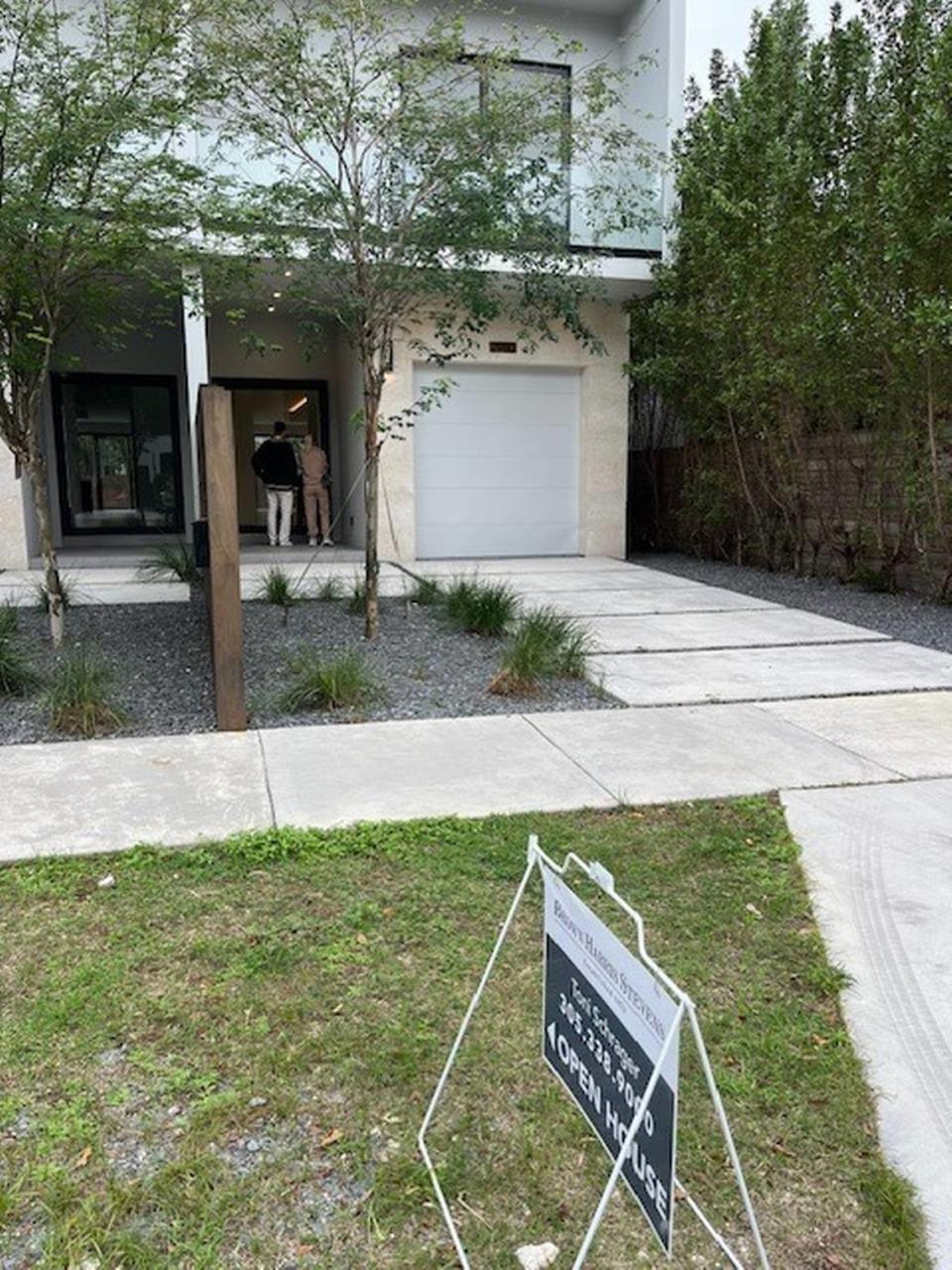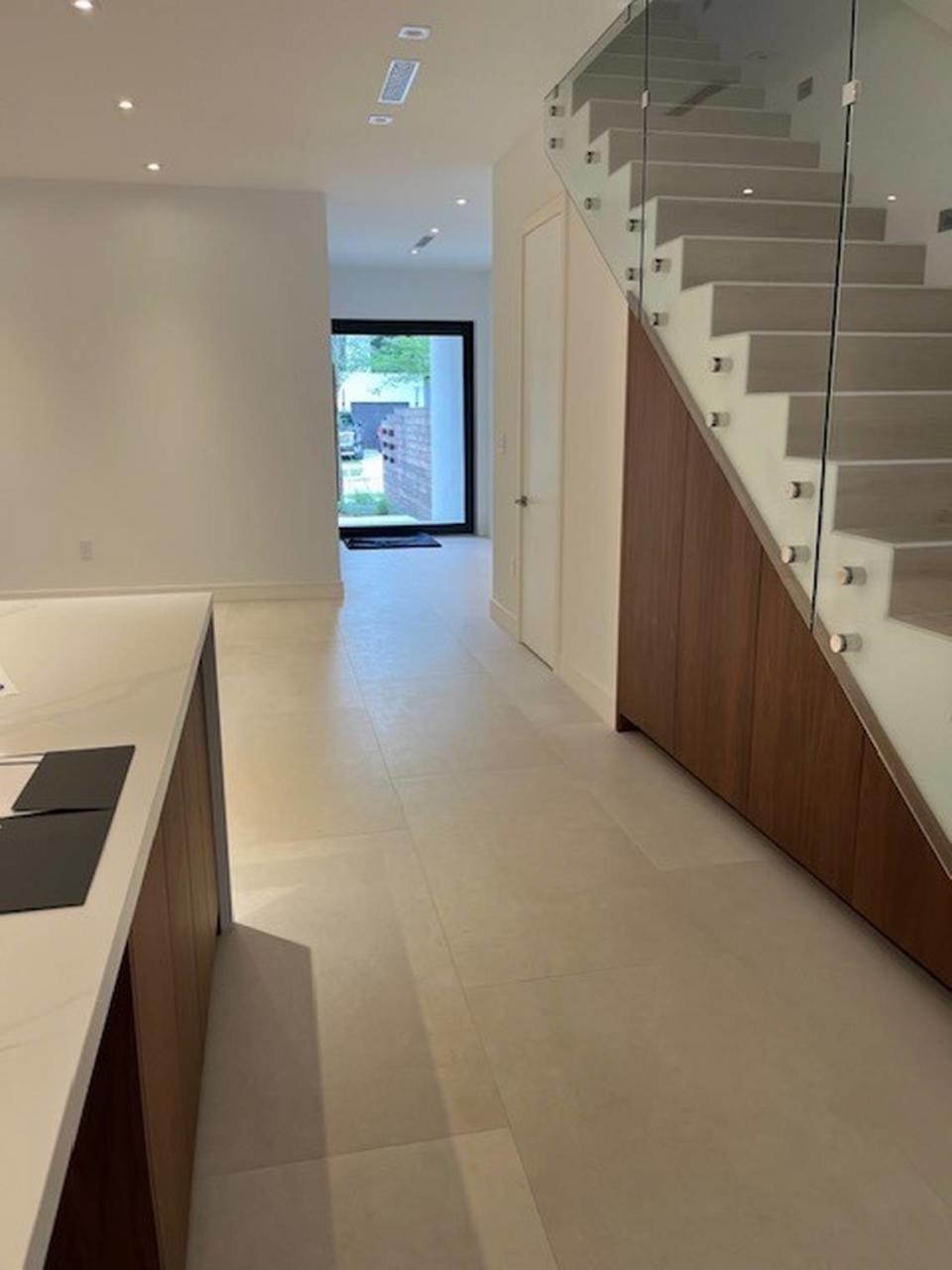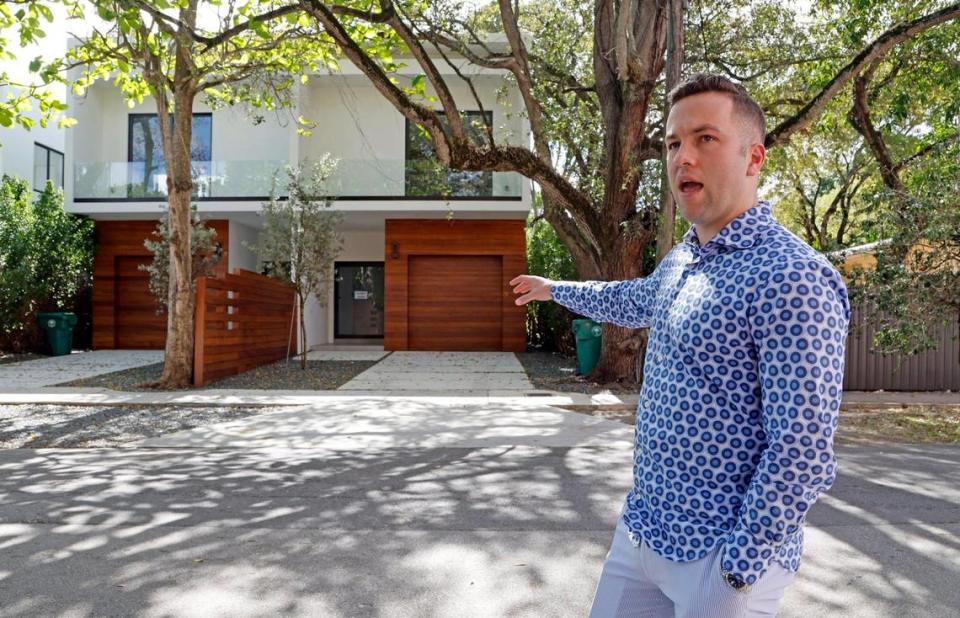Townhouses sold by ‘King of Coconut Grove’ are up for sale. But problems haven’t been fixed
The never-inhabited Coconut Grove townhouses previously sold and double sold and triple sold at increasing prices to unsuspecting buyers by a developer accused of fraud are for sale. Again.
There’s a catch. Again. The houses, selling at twice their original prices from three to five years ago, do not have certificates of occupancy and nobody can move in until they do.
But the court-appointed receiver overseeing the tangled set of lawsuits against Doug Cox and his development companies wants to sell the houses “as is” to recoup money for home buyers, investors and lenders who paid Cox more than $40 million.
Receiver Alan Fine has asked Miami-Dade Circuit Court Judge Tom Rebull to allow the sale of 12 Grove townhouses on Coconut Avenue — priced at $2.7 to $3.3 million — despite code violations, liens and purchase contracts dating from 2018 to 2023. A hearing is scheduled Wednesday.
READ MORE: They bought their dream homes from the ‘King of Coconut Grove.’ They still can’t move in
Offers on homes
Fine has received offers on the listed houses. He wants to sell them “free and clear of liens and claims” in order to maximize their value and obtain title insurance so that “future prospective purchasers of those properties would be able to purchase reasonably free of the risk of becoming ensnared in the issues giving rise to this Receivership.”

Original buyers ensnared in those very issues since they signed contracts with Cox and put down deposits with his domestic and business partner Nicole Pearl object to Fine’s plan. They had hoped Fine would sit down with them and negotiate a discounted price for their long-awaited homes, but he never offered, they said, after he initially asked if they would be interested in purchasing the homes at current market rate, which they couldn’t afford.
Fine argues that his job is to marshal what’s left of Cox’s assets and pay Cox’s creditors as much as possible, which may only be 50 to 75 percent of what they paid. Because Fine and his forensic accountants have been unable to locate unaccounted-for millions — besides the $283 and negative $14 left in two of Cox’s bank accounts — Fine needs to sell Cox’s properties at the highest price he can get.
Original buyers are angry
“We are disappointed that Mr. Fine is acting like a real estate agent and treating the real victims like a nuisance,” said Michael Coyne, who paid a $487,500 deposit on his house when his wife Oksana was expecting twins. Over the course of nearly three years, while Cox kept postponing their closing date or going incommunicado, Coyne and his family — three children and his parents-in-law from Ukraine, have lived like nomads in six rentals. His company’s relocation to Miami was disrupted as was Oksana’s nursing career.

“After all that we’ve been through we have to learn from Zillow what’s happening with our houses that we still have contracts on. We honestly feel the receivership, costing $750-plus per hour, has accomplished nothing, and no one — not Doug and Nicole, not the city of Miami building department -- has been held accountable.”
Alan Lombardi, another original buyer, adopted newborn twins in 2020 and was looking forward to having a nursery for them in his and his partner’s new home. The twins are now 4 years old. The finished house he thought he was buying for $1.2 million with a $260,000 deposit has skyrocketed in value in one of the most desirable neighborhoods in the country. It’s still empty.
“Those houses are cursed. Who would want to buy it out from under us?” Lombardi said. “Greed took over and everyone forgot about the families who were planning their future. We’re not investors making a business transaction. We’re not loan companies collecting predatory interest. Yet we’re being treated the same as those creditors; we’re paying the same consequences as a lender or investor who failed to do their due diligence.”
“We’ve discovered justice is very expensive and very elusive,” said Lombardi, who has spent about $50,000 to hire a lawyer.
The original buyers say it’s ironic that the houses are again being sold without certificates of occupancy. That was the impediment Cox kept citing as he assured buyers he had a special relationship with the city’s inspectors — a couple more cafecitos with them and he would obtain the COs within a month, or two, or six.
He was allowed to work through a Stop Work order for a year, and he bragged about the campaign contributions he made to Miami Mayor Francis Suarez. He called himself the King of Coconut Grove.
Cox is facing multiple lawsuits but claims no wrongdoing, except for mismanagement. Buyers have complained to the police, state attorney’s office and FBI about Cox, alleging he stole their money by running a real estate Ponzi scheme, but he has not been charged with a crime.
Cox has repeatedly declined the Herald’s requests for an interview.
Building code issues
Code problems remain today but should be resolved soon, say Fine and real estate agent Toni Schrager. The glass railing along interior staircases is too narrow. Swimming pool wiring must be redone. And there are other issues, Fine said. Buyers may be offered a clause to cancel their contracts and get a refund of their deposits if COs are not ready in 120 days, according to a court filing.

“It’s been almost a year since the receiver was appointed and still no COs. That was supposed to take him 60 days,” said Kevin Ware, who put down a $433,750 deposit for a $1.7 million purchase price on a townhouse at 2992 Coconut Ave. in March 2021.
Fine hired real estate broker Vivian Dimond to analyze the properties, complete inspections and obtain COs. She has been paid $343,374.52 by Fine for fees and expenses to date.
“The case could have been handled in a different manner without all this wasted time and expense,” Ware said. “Do you really think they’d be eager to sell these if the market hadn’t doubled? What if the market had stagnated or gone down? They’d be coming to us waving contracts in our faces and telling us to close. I am ready, willing and able to close right now for my original price or a discounted market value price but the receiver hasn’t engaged us and that is a great shame.”

Buyer Alexandra Cardoso, who put down $155,000 and signed her contract for 2980 Coconut Ave. in 2018, said her house was listed without any notification from Fine. She asked him to remove it so she might have a chance to buy it herself -- rather, re-buy it. He replied that he would tell the agent to remove it, but it’s still listed, as “newly built,” although it was built four years ago, with 5 bedrooms and 4,046 square feet for $3.3 million.
“We thought the receiver would help us force Doug to complete the houses and get COs. We thought that was the democratic solution,” Cardoso said. “But the receiver’s goal is to get maximum dollars and we are the sacrificial lambs.”
Cardoso is looking for closure after years of agony dealing with Cox and the city.
“We had our contract reviewed by an attorney and it’s been eye-opening to learn it is not the ironclad legal document you thought it was and in the end you could be left with nothing,” she said. “Our contracts are rendered meaningless by the all-powerful receiver while we’ve heard he has four new contracts in hand. When do we get our day in court? What recourse does the average consumer have in these cases? Who is protecting the buyer and punishing the developer?”
Buyers who signed contracts with Cox in late 2022 and 2023 said he never disclosed they already had pending contracts on them. They put down $800,000 to as much as $1.5 million in deposits, which they allege went into Cox’s pockets.
The receivership has been paid $1 million since appointment in May 2023, but that has not covered all the fees and expenses incurred and continuing to incur, according to the reimbursement application Fine submits to Rebull each month. For February, he lists his bill as $36,235.00 at $750 per hour, his counsel Berger Singerman’s bill as $163,017.05, and his forensic accountant Kaufman Rossin’s bill as $30,491.35 for a total of $229,743.40.
Fine says he wants to sell the Coconut Avenue townhouses, plus two on Shipping Avenue and a single-family home on Park Avenue without delay. The receivership is short on cash, has not been able to acquire property insurance on the houses and is paying $5,000 per day in interest on a settlement involving Altamar Financial Group’s $33 million loan to Cox.
Buyers assert that if Fine and his accountants recovered at least some of the missing funds from Cox and Pearl, Fine would be able to afford honoring some contracts and selling the houses at lower prices.
“Nearly a year on this case with expert investigators being paid handsomely and the receiver has not figured out where a penny went,” Ware said. “I understand a lot of people have come out of the woodwork with claims, a lot of predatory lenders -- the sharks became the prey. But what have you done for the buyers who stuck their necks out to expose Cox? Where’s the money? Doug and Nicole are not sophisticated enough to pull off a big heist. This isn’t Oceans 11.”
Fine’s counsel, Paul Singerman, has said Cox and Pearl’s books were such a mess that it has been hard to find a money trail. The couple was taking out one high-interest loan to repay another, after another, after another, Singerman said, and it is plausible they ran through all the money.
“Our only hope is that Judge Rebull will look at this case from our point of view,” Lombardi said. “We want to keep fighting for what is fair.”


